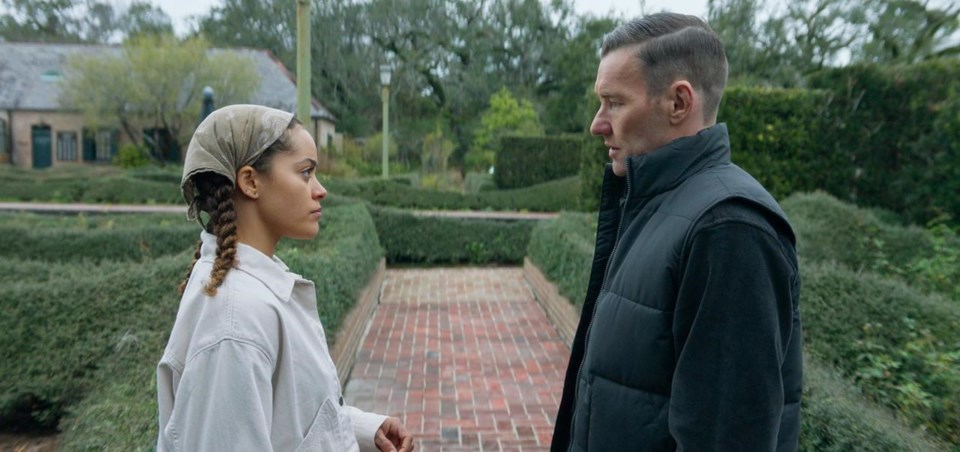Paul Schrader plants the seeds of an intriguing melodrama in his latest creation ŌĆ£ .ŌĆØ
Sigourney Weaver is a wealthy dowager with a stately name (Norma Haverhill), a large house and a dog sheŌĆÖs named porch dog. She also has a horticulturist (Joel Edgerton) in her employ who she occasionally calls on for extracurricular, indoor activities. ThereŌĆÖs even a big charity auction coming up that she and the gardening staff are intensely focused on.
But this being a Schrader film (he wrote and directed), it is mostly window dressing. There even is a palpable (and, IŌĆÖd imagine, intentional) artificiality to the whole endeavor, creating an unease that looms over the most mundane and superficially pleasant interactions. The ceremony never feels quite right. The house, though grand, is also sparse in its d├®cor. It feels like a set ŌĆö not a place that a real human being lives. We don't even get to see the charity auction in full swing, never fulfilling EdgertonŌĆÖs Narvel Roth (yes, Narvel) tease how much fun it is to ŌĆ£watch grown men in pastel pants outbid each other for a flower.ŌĆØ
This story is about a man with a violent past who has been saved by the precision of gardening. Even if itŌĆÖs not a perfect trilogy, itŌĆÖs at least in dialogue with his recent films ŌĆ£The Card CounterŌĆØ and ŌĆ£First Reformed,ŌĆØ both about solitary, tortured men whose professions double as metaphor. Actually, thatŌĆÖs true of most Schrader films. And it invites some memorable writing, mostly in voiceover, as Norvel opines and explains that ŌĆ£gardening is a belief in the future.ŌĆØ
But Narvel didnŌĆÖt come into the world as a gardener, or Narvel for that matter ŌĆö these are identities he adopted later in life. This dutiful, buttoned up green thumb has underneath his practical coveralls a body covered in telling tattoos and a memory full of racially motivated murders. He is reformed now, mostly, but the music gets ominous when the shirt comes off and he stares at his past in the mirror. Like any good gardener knows, he can try to manage nature but that only goes so far.
The chaos factor comes in the form of Norma HaverhillŌĆÖs great-niece, whose drug-addict mother has died and who she decides should apprentice with Narvel in the garden. Maya (Quintessa Swindell) quickly takes to gardening, clashes with Norma (who called her ŌĆ£mixed bloodŌĆØ and is reluctant to form a relationship) and falls for Narvel.
Before he started shooting the film, Schrader said he was thinking about a man torn between two women, one old enough to be his mother, one young enough to be his daughter.
ŌĆ£What would happen in ŌĆśTaxi DriverŌĆÖ if Cybill Shepherd and Jodie Foster went out to get coffee?ŌĆØ he asked.
That premise, while possibly interesting, is really only given one scene thatŌĆÖs not quite as revelatory as Schrader suggested. And it certainly does nothing with the idea of Narvel being torn ŌĆö once the young one enters the picture, beyond one rejection out of decorum, you know exactly where Narvel has fixated his gaze. Does this fit in with the gardening metaphors? Is Maya's mixed race supposed to be more meaningful because of his past? Are we really supposed to buy their connection or their ability to save one another? It's a little murky.
That kind of goes for the whole movie, which moves at a glacial pace even when it veers into thriller and revenge territory. But Edgerton is a sly and captivating performer, Weaver makes a meal out of every backhanded remark (and outfit), and Swindell, who is nonbinary, is a luminous presence.
Like a haphazardly planted garden, itŌĆÖs lot of ideas that donŌĆÖt seem to create anything terribly coherent but it has its individual pleasures nonetheless.
ŌĆ£Master Gardener,ŌĆØ a Magnolia Pictures release in theaters Friday, is rated R by the Motion Picture Association for ŌĆ£brief sexual content, nudity and language.ŌĆØ Running time: 107 minutes. Two and a half stars out of four.
ŌĆö-
MPA Definition of R: Restricted. Under 17 requires accompanying parent or adult guardian.
ŌĆö-
Follow AP Film Writer Lindsey Bahr on Twitter: www.twitter.com/ldbahr.
Lindsey Bahr, The Associated Press



